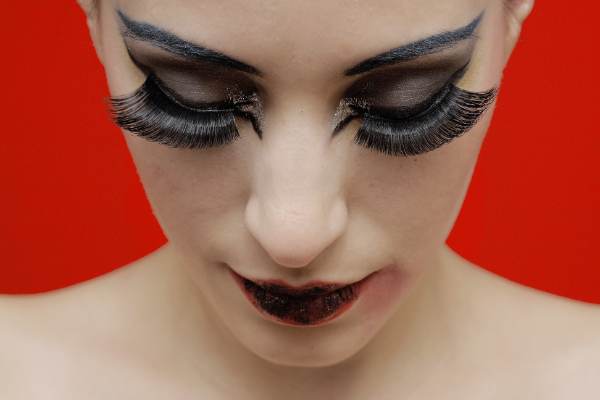Allergic To Eyelash Glue: What To Do?

Some individuals may experience an allergic reaction to eyelash extensions or develop other eye health problems as a result. This guide is for you if you are allergic to eyelash glue. In this article, we’ll talk about the causes of eyelash glue allergies and how to treat them.
What Is Eyelash Extension Glue Allergy
An allergy is our body’s natural response to ordinarily harmless substances (like pollen, and peanuts) known as allergens. Unfortunately, it is unknown why some people’s bodies respond negatively to particular allergens.
The human body creates ‘antibodies,’ which are substances that fight against allergens when a person’s body begins to react against them.
Your body will fight the allergen even more vigorously the more exposure you give it. Consequently, an allergic reaction may become more severe with increased exposure.
How Long The Reaction Lasts
A person’s symptoms could last anywhere from a few hours to a few days, depending on how severe the allergic reaction was.
How long a person may be affected by eyelash extensions depends on treatment. If reactions continue after a few days, a person should consult a doctor.
Causes Of An Allergy To Lash Glue
Lack Of Eyelash Care
After each wear, make sure to wash your eyelashes with warm water and mild soap. Never apply petroleum jelly, wax, or any other product to the lash line because doing so could cause an allergic reaction if the glue is present.
Make sure your false lashes are clean if you experience irritation while wearing them. To prevent cross-contamination and potential bacterial or fungal infection, do not share them with anyone else.
If you do experience irritation, remove the glue as soon as you take off your eyelashes using a cotton swab or pad dipped in warm water and a mild makeup remover.

Harsh Chemicals In The Eyelash Glue
Although the majority of lash glues only contain three ingredients, it’s the chemical makeup that counts. Because they have a strong hold on the lashes and don’t dry out as quickly, latex and formaldehyde are common ingredients in adhesives.
The issue with these chemicals is that certain individuals may be allergic to them, which can cause eye irritation after wearing false lashes.
You Have Sensitive Skin/eyes
This is typical for those who are just beginning to wear strip lashes or eyelash extensions, but after wearing them for a while, it is also possible to develop an allergy. The glue itself or even the detergents used to remove the adhesive from your lashes can irritate sensitive eyes.
Symptoms Of Lash Extension Glue Allergy
A person’s eyelid or eye could react allergically. The symptoms a person may experience depend on where the allergic reaction takes place.
Allergic Reaction In The Eyelids
According to a 2019 study, the most common complication associated with eyelash extensions was allergic blepharitis. Symptoms of allergic blepharitis include:
- tearing
- irritation
- redness
- itchiness
- swelling
Even though the allergic reaction may affect both eyelids, it might be more severe on one of them. It can happen right away after the eyelashes are applied, or it can take several hours or even days.
Allergic Reaction In The Eyes
Various symptoms, including Allergic reactions in the eyes can cause:
- redness
- irritation
- itchiness
- watery eyes
The allergic reaction may manifest right away or it may take several hours to a few days. Direct contact with the glue can result in an allergic reaction, as can breathing in glue vapors.
Treatment
If the reaction is mild, the patient might be able to treat the symptoms at home. They can try:
- eye drops
- cold compresses
- antihistamines
- hydrocortisone cream or ointment
Additionally, if your eyes are scratchy, you should avoid rubbing them.
One should consult a doctor for treatment if their symptoms are severe. A doctor can determine the reaction’s severity and offer a tailored course of treatment.
Prevention
Choosing a qualified cosmetologist who can carry out the procedure safely is important. A person should also make sure the salon is clean overall.
It may result in reactions or infections in the person’s eyes if the procedure uses unkempt facilities or takes place there.
Furthermore, while filling out the application, one should close their eyes. This should stop the glue from dripping into the eyes.
Additionally, the glue’s vapors have the potential to irritate the eyes. There may be irritation symptoms after coming into contact with the glue or the vapors.
Eyelash extensions can cause reactions in some individuals more than others. The Board of Barbering and Cosmetology advises against giving eyelash extensions to people who have certain conditions or risk factors. Some of these individuals are:
- have alopecia
- have trichotillomania, which is a condition that causes people to want to pull out their eyelashes
- are receiving radiation or chemotherapy treatment
- have an allergy to latex or any ingredients present in the adhesive or lashes
- are already experiencing inflammation or irritation in the eyes or have open wounds on them
What Doesn’t Trigger Lash Adhesive Allergies
Lash adhesive allergies are not brought on by formaldehyde. As eyelash extension adhesives degrade over time, formaldehyde does form as a byproduct — but the amount is so traced that the glue is considered formaldehyde-free.
In a similar vein, allergic reactions are not brought on by the vapors, fumes, or by-products created by the adhesive, no matter how annoying or strange they may be!), though they can irritate the eyes if lids are not properly shut.
The longer a client’s skin is exposed to the adhesive and the more times it comes into contact with their skin, the more likely it is that they will experience an allergic reaction in the future.
It is not the lash extensions themselves that can cause allergic reactions, but rather the proximity of the adhesive to the skin and eyeball when they are attached too closely to the lid.
How To Wear Lashes If You Are Allergic To Eyelash Glue
Always perform a test application before having your lashes applied or applying your own strip lashes. Check for a reaction after 24 hours by dabbing a small amount of glue on the inside of your wrist.
If not, you can proceed and test a few lashes or, if you feel confident, the entire set. Make sure to express your concerns up front and inquire about what they do in the event of a delayed reaction if a technician is applying them.
